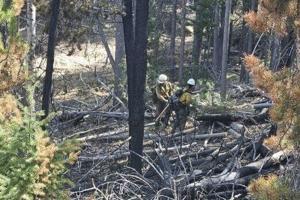The UK's first national kelp conference has taken place at the University of Sussex. The Kelp Summit 2025, titled "Progress Beyond Protection," was hosted by the Sussex Kelp Recovery Project (SKRP) and supported by the Environment Agency. The event brought together more than 200 scientists, conservationists, and policymakers to share knowledge on conserving underwater forests.
Henri Brocklebank, director of conservation at Sussex Wildlife Trust and chair of SKRP, said: "Sussex has put rewilding on the map – starting with the epic Knepp rewilding project and now with the largest marine rewilding initiative in the UK. "We are thrilled to welcome participants for the UK’s first national kelp ecology conference to progress marine research, monitoring, and recovery at scale." Kelp forests are considered among the most biodiverse and productive ecosystems on Earth, with each individual kelp hosting as many as 80,000 organisms.

(Image: Paul Boniface) Kelp forests are considered among the most biodiverse and productive ecosystems on Earth, with each individual kelp hosting as many as 80,000 organisms. However, they are threatened by global and local pressures, including climate change, pollution, trawling, increased sediment, and invasive species. In the UK, kelp beds of large brown seaweeds are estimated to occur along 60 per cent of the coastline, from the east coast of Scotland to the Isles of Scilly.
In Sussex, kelp forests once covered vast areas from Selsey to Shoreham, but by 2019, 96 per cent of kelp forests had been destroyed. This was largely due to the Great Storm of 1987, followed by destructive fishing practices known as bottom-trawling. In Sussex, kelp forests once covered vast areas from Selsey to Shoreham, but by 2019, 96 per cent of kelp forests had been destroyed.
(Image: Big Wave Productions) In support of the summit, Blue Marine Foundation, an SKRP partner, launched their report, "UK Kelp Recovery: Barriers and Optimum Conditions," which identifies the factors affecting kelp growth and recovery. The report suggests that reducing pollution, disturbance, and sedimentation from dredging and trawling are crucial to allow natural kelp recovery and prevent the decline of healthy kelp beds. Pippa Moore, professor of marine science at Newcastle University and co-author of the report, said: "Kelp forests are some of the most productive on earth and provide a wealth of goods and services to human society.
"At the same time, they are at risk from human activities such as climate change, destructive fishing practices, and pollution." Sam Fanshawe, senior UK projects manager from Blue Marine Foundation and report co-author, said: "The landmark Sussex IFCA Nearshore Trawling Byelaw was the first vital action to remove the main cause of disturbance to the seabed and create the conditions needed for kelp to resettle and grow. "Sadly, other impacts such as increased levels of sediment, nutrients, and pollution could impede the natural recovery of kelp habitats and the wider marine ecosystem.
"The report on UK Kelp Recovery: Barriers and Optimum Conditions draws together our knowledge of the key factors needed to allow kelp growth and the return of the once abundant kelp beds in Sussex and avoid declines in other regions." The outcomes of the Kelp Summit 2025 and the conclusions of the report will provide invaluable insights and help drive meaningful progress towards a wider understanding of kelp ecosystems and marine recovery in Sussex and beyond. (Image: Big Wave Productions) The outcomes of the Kelp Summit 2025 and the conclusions of the report will provide invaluable insights and help drive meaningful progress towards a wider understanding of kelp ecosystems and marine recovery in Sussex and beyond.
Pippa concluded: "Having a sound understanding of the conditions that encourage or hinder kelp recovery when it is disturbed is vital before making informed management decisions on whether passive or active approaches to kelp recovery are required. "This report provides the context for UK waters." More information can be found at Sussex Kelp's website.
.
Health

UK's first national kelp summit takes place at university

The UK's first national kelp conference has taken place at the University of Sussex















